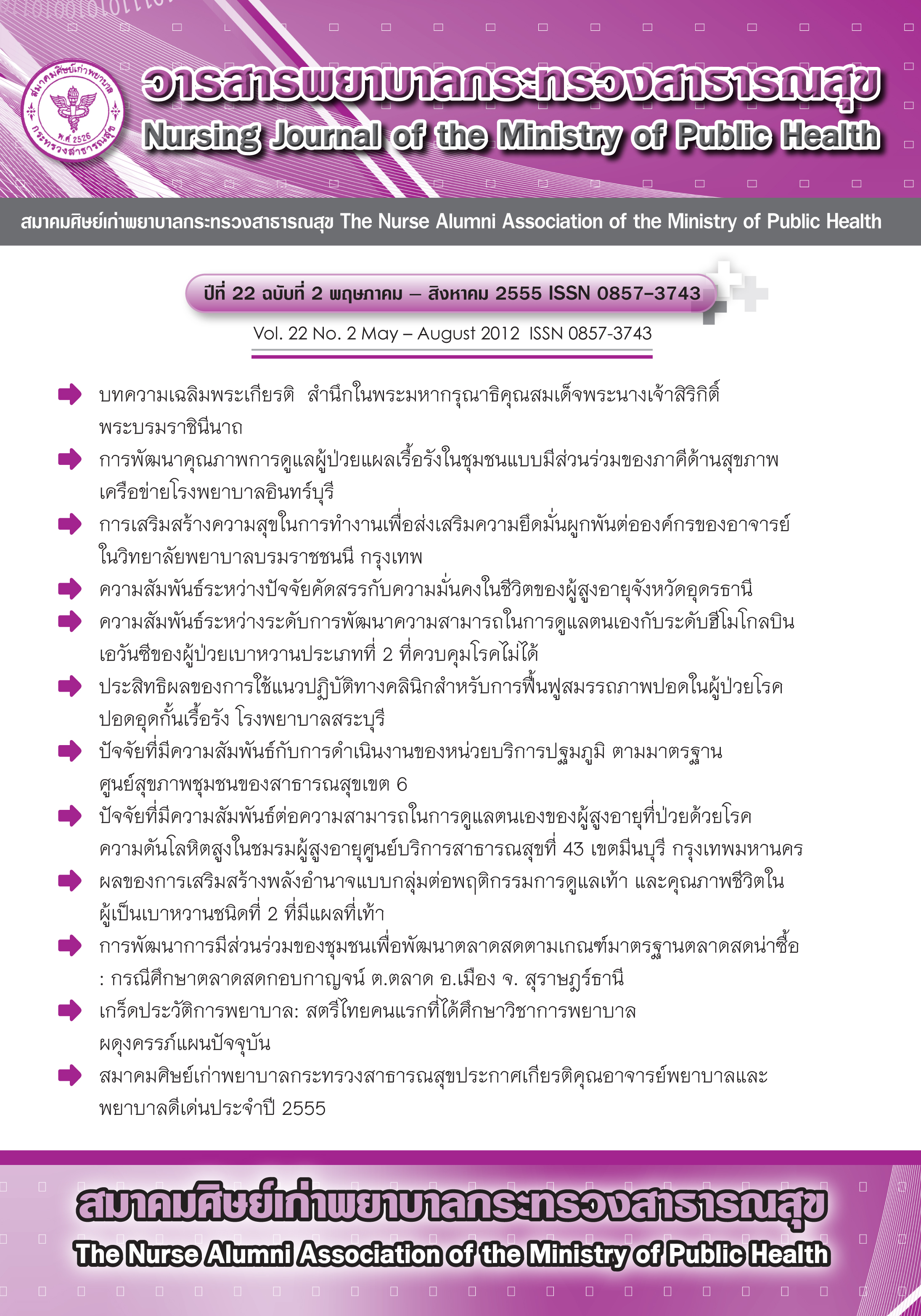ความสัมพันธ์ระหว่างปัจจัยคัดสรรกับความมั่นคงในชีวิตของผู้สูงอายุ จังหวัดอุดรธานี
Main Article Content
Abstract
บทคัดย่อ
ความมั่นคงในชีวิตมีความสำคัญต่อผู้สูงอายุและสัมพันธ์กับหลายปัจจัย หากครอบครัว ชุมชนและสังคมขาดการดูแลคุ้มครองผู้สูงอายุ สถานการณ์การเพิ่มของผู้สูงอายุจะเป็นปัญหาสำคัญของประเทศในอนาคต การวิจัยครั้งนี้เป็นการวิจัยเชิงบรรยาย เพื่ออธิบายความหมายของมั่นคงในชีวิตของผู้สูงอายุ ระดับความมั่นคงในชีวิต ปัญหาความมั่นคงในชีวิตและแนวทางพัฒนา วิเคราะห์ความสัมพันธ์ระหว่างปัจจัยส่วนบุคคล สุขภาพ ครอบครัว เศรษฐกิจ ที่อยู่อาศัยสิ่งแวดล้อมและสังคมกับความมั่นคงในชีวิตของผู้สูงอายุ กลุ่มตัวอย่างเป็นผู้สูงอายุที่อาศัยอยู่ในทุกอำเภอของจังหวัดอุดรธานี ได้จากการสุ่มแบบหลายขั้นตอน รวม 400 คน เครื่องมือเป็นแบบสัมภาษณ์ วิเคราะห์ข้อมูลโดยใช้สถิติเชิงพรรณนาและหาความสัมพันธ์ระหว่างความมั่นคงในชีวิตของผู้สูงอายุกับปัจจัยที่ศึกษา โดยใช้สัมประสิทธิ์สหสัมพันธ์ของเพียร์สันและไคสแคว์
ผลการวิจัยพบว่า ผู้สูงอายุให้ความหมายชีวิตที่มั่นคงประกอบด้วย การมีสุขภาพดี มีครอบครัวดี มีเงินใช้จ่ายเพียงพอ เข้าร่วมกิจกรรมในชุมชน มีที่อยู่อาศัยและสิ่งแวดล้อมที่ปลอดภัย ระดับความมั่นคงในชีวิตของผู้สูงอายุด้านครอบครัว ที่อยู่อาศัยสิ่งแวดล้อมและสังคมอยู่ในระดับมาก(ค่าเฉลี่ย 4.06, 3.87และ 3.73) ส่วนด้านเศรษฐกิจ อยู่ในระดับน้อย (ค่าเฉลี่ย2.40) ภาพรวมความมั่นคงในชีวิตของผู้สูงอายุอยู่ในระดับมาก (ค่าเฉลี่ย3.55)
ปัญหาความมั่นคงในชีวิต ผู้สูงอายุมีร่างกายไม่แข็งแรงจากการเจ็บป่วย มีเงินไม่พอใช้จ่าย เข้าร่วมกิจกรรมในชุมชนน้อย สาเหตุจากการเจ็บป่วย การทำงานและเลี้ยงดูหลาน อาศัยอยู่ในบ้านที่ไม่มีการจัดเตรียมให้เหมาะสมกับวัยสูงอายุ ขาดการดูแลจากครอบครัวในการดำเนินชีวิตประจำวันและเมื่อเจ็บป่วย แนวทางพัฒนาความมั่นคงในชีวิตของผู้สูงอายุ ประกอบด้วยการ ออกกำลังกายสม่ำเสมอ การควบคุมอาหาร รับประทานยาตามแผนการรักษา การสนับสนุนด้านการเงิน ที่อยู่อาศัยและการร่วมกิจกรรมในครอบครัวและชุมชน
ความสัมพันธ์ระหว่างปัจจัยส่วนบุคคล การมีโรคประจำตัว มีความสัมพันธ์ระดับ ปานกลางกับความมั่นคงในชีวิตของผู้สูงอายุในระดับนัยสำคัญ .01 ( r=.689) ปัจจัยด้านสุขภาพ ครอบครัว ที่อยู่อาศัย/สิ่งแวดล้อมและสังคม มีความสัมพันธ์ระดับสูงกับความมั่นคงในชีวิตของผู้สูงอายุในระดับนัยสำคัญ .01 (r= .722, .811, .751และ .702) และปัจจัยด้านเศรษฐกิจ มีความสัมพันธ์ระดับปานกลางกับความมั่นคงในชีวิตของผู้สูงอายุในระดับนัยสำคัญ .01 (r= .586)
คำสำคัญ: ความมั่นคงในชีวิต, ผู้สูงอายุ
Abstract
Life security is considered to be important for the wellbeing of the elderly. The determinants of wellbeing are based on many factors. However, the situation of the elderly can result in problems unless the elderly are protected by their families, communities or the wider society.
The purposes of this study were to explore the concept of life security in the elderly, identify the factors related to life security in the elderly, investigate the life security problems and the ways to improve life security in the elderly. A multi stage random sampling of 400 elderly people living in Udonthani Province was used in the study. Data was collected by using interviews, descriptive statistics, a Pearson’s correlation and Chi-square were used to analyze the data.
The findings showed that the meaning of life security in the elderly was classified into five main categories: being healthy, having a good family, being economically secure, engaged in social activities, feeling safe in their house and the local community. The life security level for health, family, social, house and environment were at the highest levels (x¯= 3.68, 4.06, 3.73, 3.87 respectively) while the economics was at the lowest level (x¯=2.40) .Overall life security was at the highest level (x¯= 3.55).
The problems of life security in the elderly included physical weakness from diseases, insufficient money, less physical activity in the community due to their sickness, working and taking care of the children, living in a poorly prepared house and lack of support from their families to meet the activities of daily living and assistance in coping with their sickness. The ways to improve life security in the elderly should focus on regular exercise, diet control, following instructions on taking prescribed medication, financial support, improving housing arrangements, joining in family and community activities.
The correlation among life security in the elderly and disease showed a statistical relationship at .01 (r=.689). Health status, family, house and environment and social support were statistically significant at .01 (r. = .722, .811, .751, .702 respectively) Economic factors was statistically significant at .01(r. = .586, .689). The findings confirm the important role played by health, family, eonomics, environment and community activities play in determining life security in the elderly.
Key words : life security in the elderly, determinants of wellbeing
Article Details
บทความและรายงานวิจัยในวารสารพยาบาลกระทรวงสาธารณสุข เป็นความคิดเห็นของ ผู้เขียน มิใช่ของคณะผู้จัดทำ และมิใช่ความรับผิดชอบของสมาคมศิษย์เก่าพยาบาลกระทรวงสาธารณสุข ซึ่งสามารถนำไปอ้างอิงได้

